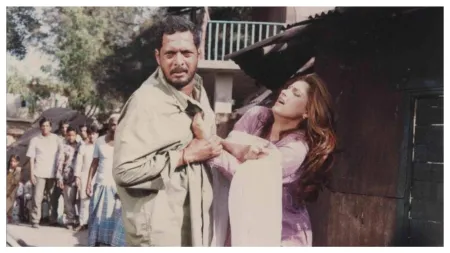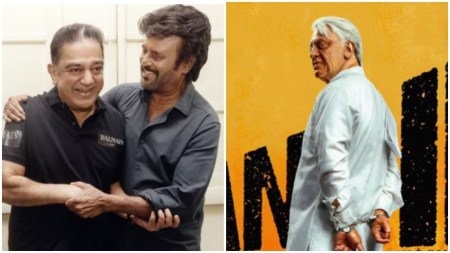‘Sab kuchh seekha humne, na seekhi hoshiyari, sach hai duniyawalo ki hum hain anari’.
When the legendary KL Saigal first heard “Dil Jalta Hai Toh Jalne Do,” it left him confused. He tried to recall if he sang the number, and asked, “When did I record this one?” For Mukesh, who rose to instant fame with this Pehli Nazar song, there couldn’t have been a bigger compliment than this. In an era when every aspiring male playback singer followed Saigal, Mukesh was no exception.

Mukesh, who started his singing career by emulating Saigal and was known for his nasal twang and sonorous singing, carved out his own identity and voice. He may have wanted to be the second KL Saigal, but he became Mukesh, one of the greatest singers of his time. His voice resonated deeply with listeners. Mukesh’s ability to convey raw emotion and vulnerability made his songs timeless. He had a unique talent for expressing pain and melancholy, which struck a chord with people across generations. The emotional depth in his voice made his music relatable, connecting with the audience on a personal level. His songs often touched on universal themes of love, loss, and longing, making them enduring classics. A few months before his death in 1976, he told BBC Hindi, “If I get 10 light songs and one sad song, then I’ll leave those 10 songs for that one sad song. ”
 Mukesh Chand Mathur, known simply as Mukesh, was a renowned Indian playback singer, celebrated as one of the Hindi film industry’s most popular and acclaimed voices (Express Archive Photos)
Mukesh Chand Mathur, known simply as Mukesh, was a renowned Indian playback singer, celebrated as one of the Hindi film industry’s most popular and acclaimed voices (Express Archive Photos)
Born Mukesh Chand Mathur on July 22, 1923, in Delhi, the seventeen-year-old Mukesh, who dreamed of becoming an actor in Hindi films, found his life taking an unexpected turn. Actor Motilal, who heard him sing at his sister’s wedding, paved the way for a journey far from his family’s expectations. His father, a businessman with a large family, envisioned a more conventional and ‘respectable’ path for Mukesh — a stable clerical job. The allure of the film industry was deemed unsuitable for a ‘child from a good family’. Yet, the mention of KL Saigal, convinced Mukesh’s father, Zorvar Chand Mathur.
 Singer Mukesh, Music Director Jagdish, Lyricist Dev Kohli at Famous Studio in Tardeo, Mumbai. (Photo: Express archive)
Singer Mukesh, Music Director Jagdish, Lyricist Dev Kohli at Famous Studio in Tardeo, Mumbai. (Photo: Express archive)
It was the Bollywood of the ‘40s and the singer-actor combination was the norm. Capitalising on Mukesh’s good looks, Motilal gave him a role in the 1941 film Nirdosh opposite Nalini Jaywant. Unfortunately, the film was a failure, and Mukesh’s debut song, “Dil Hi Ho Bujha Hua Toh,” met a similar fate. With the production house closing its doors, Mukesh found himself jobless. “After this, I became a share broker, a dry-fruit seller and did one thing after another as playback singing as a profession did not exist until 1942, when Debaki Bose began singing in Calcutta,” said Mukesh in an interview to BBC Hindi. According to Mukesh’s son Nitin Mukesh and playback singer, the legendary singer tried film distribution, too, but that didn’t work either. “He soon realised that it was better to be a first-class singer than a second-class actor. So he focused on music,” Nitin said in an interview.
Mukesh was meant to be a singer, one who would be remembered decades after he was gone. He may not have had the classical training or the voice like Mohammad Rafi, Talat Mahmood, Kishore or Manna Dey, but he could touch the listeners hearts with the way he could emote pain through his songs. A balm for broken hearts, “Dil Jalta Hai Toh Jalne De” became an instant sensation, dominating the airwaves for weeks and securing its status as a timeless classic. As Nitin recalls, “Those who entered the cinema halls emerged humming this unforgettable melody that continues to resonate today.”
 Playback singer Mohammad Rafi. (Express Archive Photo)
Playback singer Mohammad Rafi. (Express Archive Photo)
Under the guidance of composer Naushad, who encouraged him to embrace his own unique voice rather than imitate Saigal, Mukesh developed a distinctive style. This evolution led to the creation of timeless classics like “Gaaye Ja Geet Milan Ke” (Mela, 1948) and “Hum Aaj Kahin Dil Kho Baithe” (Andaz, 1949). Mukesh possessed a voice of immense warmth and subtlety — a voice that invited intimacy, a confidant for the heart. His nuanced expressions, free from excessive ornamentation, were both captivating and profound. While versatile and adaptable to various musical genres, Mukesh was particularly celebrated for his poignant renditions of melancholy. His voice became synonymous with the nation’s collective sorrow and longing. Songs like Sahir Ludhianvi’s hopeful “Woh Subah Kabhi Toh Aayegi” (Phir Subah Hogi, 1958), Heeraman’s heart-wrenching “Sajanwa Bairi Ho Gaye Hamaar” (Teesri Kasam, 1966), the evocative plea of “Aa Laut Ke Aaja Mere Meet” (Rani Rupmati, 1959), the wistful beauty of “Ek Pyaar Ka Nagma Hai” (Shor, 1972), and “Dost Dost Na Raha” (Sangam, 1964) continue to provide comfort to bruised hearts even today.
ALSO READ Why Abhishek Bachchan liked a post about divorce; and it has to do with Aishwarya Rai’s close friend
But his voice wasn’t just a teaser-jerker. It left a mark on those who worked with him as well as those who listened to his songs. He owned those songs and made them his own. Anandji Shah, one half of the legendary music duo Kalyanji-Anandji, in an interview with The Indian Express, reminisced about their extensive collaboration with Mukesh. “His voice could accentuate sad songs like no one else. Ours was a time of social and romantic dramas and the way he’d emote such tender emotions was brilliant. If I look at any of our songs by Mukesh saab such as ‘Koi Jo Hamara Hridaya Tod De’, ‘Chandan Sa Badan’, or ‘Mujhko Iss Raat Ki Tanhai Mein Awaaz Na Do’, he’s emoted so tenderly. In fact we won our first National Award in 1968 for Saraswatichandra and ‘Chandan Sa Sadan’ was the marquee piece,” shared Anandji.
 Raj Kapoor with Mukesh (Credit: Express Archives)
Raj Kapoor with Mukesh (Credit: Express Archives)
Where did this pain come from? Nitin believes his father’s extraordinary ability to evoke pathos stemmed not from personal hardship but from an innate empathy. Nitin describes his father as a deeply “compassionate person” as his kindness was evident in countless small but meaningful gestures. Even at the height of his fame, he would take the time to inform the building’s cleaning staff about his upcoming travels, ensuring they knew Nitin would be available if they needed anything. Once, the family’s ironer invited him to his daughter’s wedding, and Mukesh not only attended but also sang for the guests.
Mukesh’s unparalleled ability to evoke profound emotion is evident in his iconic rendition of “Zindagi Khwaab Hai” from Jaagte Raho (1956). Even the legendary Manna Dey acknowledged Mukesh’s supremacy in this realm, despite his own technical brilliance. Manna Dey, an avid collector of Mukesh’s discography, would often say, “Would I ever be able to sing like him? With the pain that Mukesh ji finds and channels in what he sings?”.
Despite his limitations as a singer, Mukesh consistently outshone other male singers, even when given fewer opportunities. A prime example is the background song “Chal Ri Sajni” from Bambai Ka Babu (1960), which eclipsed Rafi’s chart-topping “Saathi Na Koi Manzil.” Initially intended for Kishore Kumar, the song was eventually given to Mukesh after Kishore’s refusal. Even SD Burman, known for his discerning ear, had doubts about Mukesh’s suitability for the song but was ultimately captivated by his performance.
 Raj Kapoor directed and starred in the 1970 movie Mera Naam Joker. The songs from the film was sung by Mukesh Kumar (Photo: Express Archive)
Raj Kapoor directed and starred in the 1970 movie Mera Naam Joker. The songs from the film was sung by Mukesh Kumar (Photo: Express Archive)
Mukesh’s magic was evident in his collaboration with SD Burman on “O Jaane Waale Ho Sake Toh Laut Ke Aana” from Bandini (1963). Despite the haunting beauty of Burman’s own rendition of “O Re Maajhi,” Mukesh’s version emerged as the more popular choice.
ALSO READ Neha Dhupia says she’s struggling: ‘I can’t remember when was the last time I got a Hindi film offer’
While Mukesh sang the most songs for Dilip Kumar and Manoj Kumar, it was Raj Kapoor who truly made him a star. The collaboration with Dilip Kumar was brief, as he later chose Talat Mahmood and then Mohammed Rafi for his playback singing. The collaboration between Raj Kapoor and Mukesh was a cinematic alchemy that defined an era. Their partnership ignited with Aag (1948), where Mukesh’s rendition of “Zinda Hoon Is Tarah” for Kapoor marked the birth of a legendary duo. Kapoor when heard Mukesh, told him, “Ab tub sirf mere liye gaaoge,” Mukesh’s voice was the perfect counterpoint to Kapoor’s on-screen persona: a tragicomic tramp navigating life’s complexities. Kapoor famously declared, “Mukesh meri rooh hai!” (I am merely the body, while Mukesh was the soul of my characters.)
Kapoor’s portrayal of impoverished innocents found its most authentic expression through Mukesh’s voice. In a post-Independence India grappling with the harsh realities of life, Mukesh’s ability to convey both pain and hope resonated deeply. Their songs, from the timeless melodies of Barsaat (1949) to the poignant notes of “Mera Naam Joker” (1970), are etched in the collective memory of the nation. “It was uncanny. They also spent a lot of time together socially,” Nitin told Hindustan Times.
View this post on Instagram
A post shared by Sony Entertainment Television (@sonytvofficial)
Kapoor once told a reporter, “I loved Mukesh not only because he was my ‘soul,’ but also because he was the shoulder I leaned on. Mukeshchand was the most affable person I knew, never speaking ill of anyone. He was patient, a great listener, and universally well-liked.”
Mukesh was the quintessential voice of the idealistic 1950s and 60s. His soulful melodies mirrored the era’s optimism and empathy. As Hindi cinema evolved in the mid-70s, shifting its focus from social themes to action and revenge, the landscape for a singer like Mukesh dramatically changed. The demand for his signature style of heartfelt expression diminished as the industry embraced a new, grittier tone. Nevertheless, even during this transition, his songs continued to top the charts, a testament to his enduring popularity.
View this post on Instagram
A post shared by Nitin Mukesh (@nitinmukesh9)
Tragically, Mukesh passed away at the young age of 53 while touring the USA with Lata Mangeshkar in 1976. His untimely death was a profound loss to the music world. While he may not have possessed unparalleled technical prowess, Mukesh’s raw emotion and vulnerability resonated deeply with audiences. His sincerity was palpable, making him incredibly accessible. The secret to Mukesh’s enduring popularity lies in his ability to infuse his songs with heartfelt emotion.
“In the beginning, I thought the Mukesh craze would fade in five to ten years of his passing. But five decades after his death, people still want me not because of me but because they hear Mukesh in me. He was a rockstar,’’ said Nitin, who owes his career to his late father, who stayed simple till his last breath and didn’t let the ways of the world change him and therefore, the song, “Sab Kuch Seeka Humne….” best summarises his life.
Click for more updates and latest Bollywood news along with Entertainment updates. Also get latest news and top headlines from India and around the world at The Indian Express.
Disclaimer: The copyright of this article belongs to the original author. Reposting this article is solely for the purpose of information dissemination and does not constitute any investment advice. If there is any infringement, please contact us immediately. We will make corrections or deletions as necessary. Thank you.







